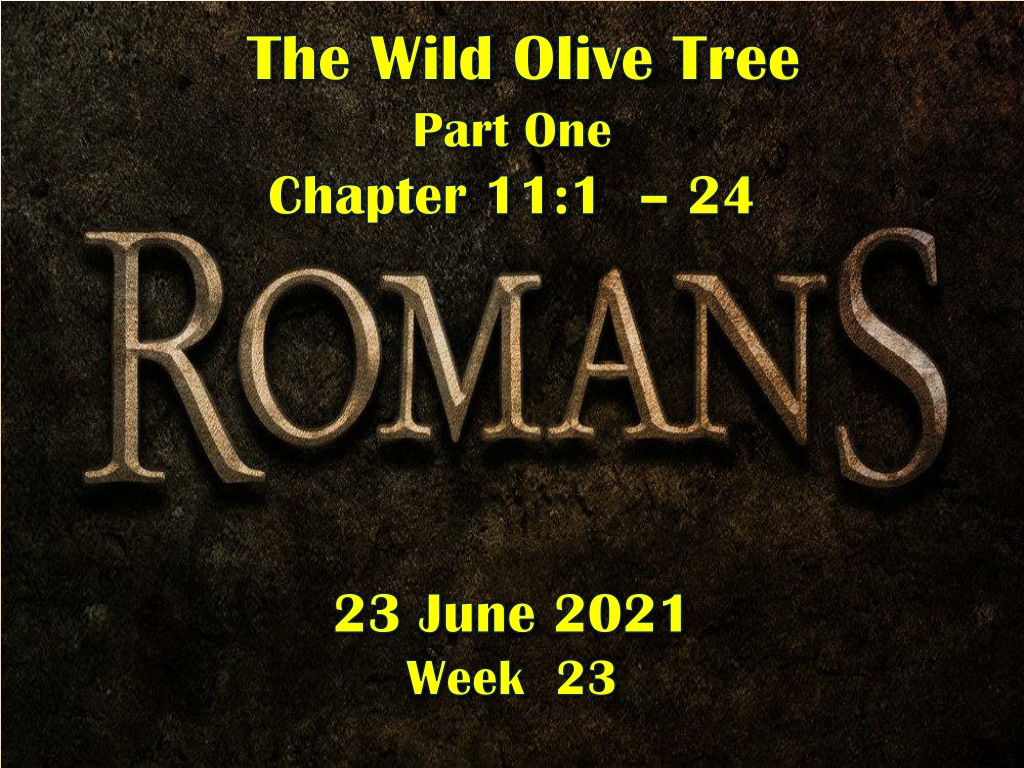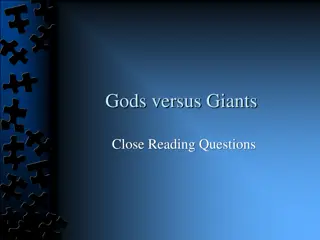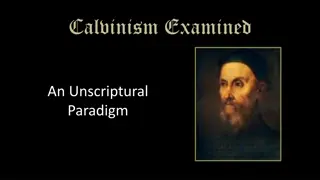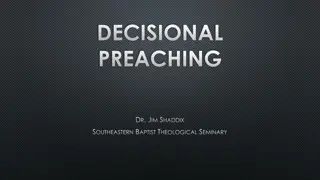Understanding God's Sovereignty in Romans: A Summary
In the book of Romans, Paul delves into the sovereignty of God and Israel's historical selection. He defends God’s righteousness and mercy, highlighting Israel's rejection and the acceptance of the Gentiles. Despite Israel's rebelliousness, Paul emphasizes God’s continued care for His people, leading to salvation for the Gentiles. The narrative underscores the intricate relationship between God, Israel, and the Gentiles, revealing the complexity of divine sovereignty and human responsibility.
Download Presentation

Please find below an Image/Link to download the presentation.
The content on the website is provided AS IS for your information and personal use only. It may not be sold, licensed, or shared on other websites without obtaining consent from the author. Download presentation by click this link. If you encounter any issues during the download, it is possible that the publisher has removed the file from their server.
E N D
Presentation Transcript
The Wild Olive Tree The Wild Olive Tree Part One Part One Chapter 11:1 Chapter 11:1 24 24 23 June 2021 23 June 2021 Week 23 Week 23
ROMANS 9 Background: In Chapter 9, Paul gives us an overview of the sovereigntyof God and Israel s selection in the past. Paul wants his readers to appreciate why and how God could choose to reject the nation of Israel (except for a remnant) and accept people from among the Gentiles. Paul defends the God s absolute sovereignty by upholding His perfect righteousness, showing us His mercy, and defending His fairness.
ROMANS 10 Background: In Chapter 10, Paul turns his attention to the responsibilityof humanity. Here, Paul laments at the failure of his unsaved Jewish brethren to see personal righteousness in its proper context. In trying to obtain righteousness through personal willpower, they missed the mark [sin] and failed to recognize their Messiah. Paul wants us to see the importance of combining zeal with knowledge and to understand that Israel had plenty of opportunity to heed the gospel of Christ, but instead they rejectedit.
ROMANS 11 Background: In Chapter 11, Paul turns his attention back to the people of Israel and answers the question if God has forgotten or just set them aside. Paul gives several examples to show that despite this rebellion, God has not totally rejected His people. Paul wants us to understand the wisdom of God and Israel s future restoration. Here, Paul wants us to see the possibility of apostasy for us today.
ROMANS 11 Summary: Paul concluded chapter ten with a quotation from Isaiah describing the nation of Israel as a disobedient and contrary people. Paul begins chapter eleven by giving several examples to show that despite this rebellion God has not totally rejected His people (1-6). What God has done, however, is harden the hearts of the rebellious Israelites (7-10).
ROMANS 11 Summary: But the outcome of this hardening led to salvation coming to the Gentiles, which in turn God was using to provoke Israel to jealousy in an attempt to win them back to Him. This is also why Paul magnified his ministry to the Gentiles, hoping to save some of his people by provoking them to jealousy (11-15).
ROMANS 11 Summary: Paul then directs his attention to the Gentile believers, explaining that their obedience allowed them to be grafted into Israel to replace those removed by their own disobedience. However, this grafting is permanent only as long as they remain faithful. In addition, if any Israelites repent of their unbelief, they too can be grafted back in (16-24).
ROMANS 11 Summary: Paul explains that this is how all Israel will be saved. Through a hardening in part mercy can now be shown to the Gentiles, and by showing mercy to the Gentiles, mercy will be available to disobedient Israel. In this way Paul can say that God has committed them all to disobedience, that He might have mercy on all, proving that God is no respecter of persons and makes His plan of salvation available to all (25-32). Paul ends this section with a doxology praising the wisdom and knowledge of God (33-36).
ROMANS 11:1 The Jews are not permanently rejected, but, through the calling of the Gentiles, they will be brought into the Church at last. Painfully recognizing the fact of the present exclusion of Israel as a nation from the inheritance of the promises made to their fathers, Paul accounts for and justifies such exclusion, and proceeds now to the question: Did God reject his people? Paul answers No; impossible; by no means!
ROMANS 11:1 Paul provides personal proof that God has not permanently cast His people aside. Paul states that I am an Israelite and my salvation is proof that God is not through with Israel. Paul s conversion is a pattern for other Jewish believers. That is, Paul s experience is a picture of the way the people of Israel will be converted at the coming of Christ in glory. Like Paul, they will be in rebellion and unbelief. They will see Him whom they pierced (Zech. 12:10 and Rev. 1:7) and will repent and be saved.
ROMANS 11:2 4 God s ancient covenant with his people stands; the remnant of believers even now is a sign of His continued favor to His ancient people. From Pentecost to the present day, Christ s church has never been without believing Jews. As was in the time of Elijah, the remnant never bowed their knees to Baal. When his life was threatened by Jezebel, even the godly and normally fearless Elijah became fearful and despondent, thinking in self pity that he was the only believer left on earth.
ROMANS 11:2 4 Through His direct word, God reassured Elijah that seven thousand others (remnant) remained faithful to the true God and had not bowed the knee to the pagan god Baal, whom the wicked Jezebel and her priests had led most of Israel to worship (cf. 1Kings 19:9 18). When Jesus Christ, came to earth, the apostate nation rejected and crucified Him. But there was a godly remnant in Israel before Jesus was born including Simeon, Anna, and the Bethlehem shepherds who received and worshiped Jesus when He was but an infant.
ROMANS 11:4 5 After the Elijah illustration, Paul drew a conclusion for his day: So too, at the present time there is a remnant according to the election of grace has come to be. Paul was only one of many in his generation elected to faith from the people of Israel. In every generation of the church a remnant chosen by grace has been called from among the Jews. Paul adds that this choice is totally by God s grace (cf. Eph. 2:8-9) and Paul emphasized the difference between grace and works (cf. Rom. 4:4-5; 9:30-32).
ROMANS 11:6 8 6And if by grace, then it cannot be based on works; if it were, grace would no longer be grace. 7What then? What the people of Israel sought so earnestly they did not obtain. The elect among them did, but the others were hardened, 8as it is written: God gave them a spirit of stupor, eyes that could not see and ears that could not hear, to this very day.
ROMANS 11:6 8 Human effort (work) and God s grace are mutually exclusive ways to salvation. Our salvation is by God s grace only, completely devoid of our work (11:6). In spite of the Jews of Paul s day intense religious zeal, they failed to obtain God s righteousness. Yet, the elect, those whom God graciously had chosen (predestinate) sought by faith and found God s righteousness (11:7).
ROMANS 11:6 8 The rest of Israel were hardened (callous) or grew deaf and were made spiritually blind. Paul uses both Deuteronomy 29:3-4 (law) and Isaiah 29:10 (prophets) to explain that hardening involves spiritual drowsiness (stupor = a numbness resulting from a sting ), (11:8). Both the law and the prophets testify to God s sovereign and predetermined hardening of hearts. But that hardening is neither capricious nor unjust. God hardens only those hearts who, in rejecting His gracious offer of righteousness, harden themselves to His grace.
ROMANS 11:6 8 God judicially hardenedPharaoh s heart because Pharaoh willingly hardened his [own] heart against God. During the Lord s Supper, Jesus said, Behold, the hand of the one betraying Me is with Me on the table. For indeed, the Son of Man is going as it has been determined; but woe to that man by whom He is betrayed! (Luke 22:21 22). God s righteous predetermination of Judas s betrayal was inextricably connected to Judas s own unrighteous intentions, for which he was held eternally accountable.
ROMANS 11:6 8 One of the great mysteries of Scripture is the coexistence of God s sovereign preordination and man s personal accountability. God s judicial hardeningof a man s heart is never separate from that man s hardening of his own heart.
ROMANS 10:9 10 Spiritual hardening is a terminal disorder for which, there is no remedy. In the same way, David spoke of their feasts (table) becoming snares and traps (Psalm 69:22 23). The very things which should have been the source of nourishment and blessing to Israel (table means their blessings from the hand of God, which should have led them to Christ) became the occasion for their rejection of God (a snare and a trap, a stumbling block (9:32) and God s judgment (retribution) on them.
ROMANS 10:9 10 When the Lord Jesus Christ came as their Messiah, He really was bringing all the benefits of a banquet. He was their table and their table became a stumbling block to them. Paul asks, Did they stumble that they might fall and never be brought back? God forbid! Because they refused to receive God s truth and Jesus as Christ, Israel s backs will be bent under the weight of guilt and punishment forever (11:10).
ROMANS 10:9 10 Here, Paul strengthens his argument with these three OT quotations (Deut., Isaiah, and Psalm) that God s people should be liable to the state of stupefaction described, without ceasing to be His people. Israel s very religious practices and observances became substitutes for the real experience of salvation. Sadly, this same mistake is made today when people depend on religious rituals and practices instead of trusting in Jesus Christ who is pictured in these activities.
ROMANS 10:9 10 Paul makes it clear that the hardening of Israel is neither total nor final, and this is proof that God has a future for the nation. Hardness in part is happened to Israel, until the fullness of the Gentiles be come in (11:25). The existence of the believing Jewish remnant today, as in Elijah s day, is evidence that God still has a plan for His people. Therefore, the present hardening of Israel as a notion was never intended to be permanent.
ROMANS 11:11 12 Israel is experiencing not a permanent fall, but a stumbling. It serves at least twodivinepurposes: (a) to offer salvation to the Gentiles, and (b) to make or provoke Israel to jealousy (cf. Deut. 32:21). In turning away from unbelieving Jews to the Gentiles, Paul was fulfilling these twodivine purposes of God. But Paul is convinced that Israel s transgression (misstep, or stumble ) is temporary.
ROMANS 11:11 12 So Paul looks beyond its immediate results (riches for the world and Gentiles) to the possibility of its removal (how much greater riches will their fullness bring). Israel s fullness suggests a large-scale conversion of the Gentiles (cf. 11:25). Certainly the world (Gentiles) has been enriched spiritually because of so many Gentiles coming to Christ. But even greater riches will be enjoyed by Gentiles after the conversion of Israel at the Lord s return (cf. 11:26).
ROMANS 11:13 16 13I am talking to you Gentiles; inasmuch as I am the apostle to the Gentiles, I take pride in my ministry 14in the hope that I may somehow arouse [provoke] my own people to envy [jealousy] and save some of them. 15For if their rejection brought reconciliation to the world, what will their acceptance be but life from the dead? 16If the part of the dough offered as firstfruits is holy, then the whole batch is holy; if the root is holy, so are the branches.
ROMANS 11:13 16 Paul singles out the Gentile Christians in the church at Rome and tells them that he is the apostle to the Gentiles (11:13). Part of Paul s purpose for magnifying his service to the Gentiles is to provoke to jealousy his fellow Jews (11:11), resulting in the salvation of some of them. Any such Jews won to Christ would be part of the remnant chosen by grace. Paul reminds his Gentiles readers that Israel s rejection meant the reconciliation of the world in the purpose of God. Because Israel rejected Christ, the gospel was taken to these Gentiles.
ROMANS 11:13 16 Because Paul was convinced that Israel s stumbling is temporary, he asked, What will their acceptance be but life from the dead? Israel s acceptance of Christ is related to the first resurrection, the resurrection of life (John 5:29). The first resurrection includes dead saints at the Rapture (1Thes. 4:13-18), martyred Great Tribulation saints raised at Christ s second coming (Rev. 20:4), and believing OT saints (Dan. 12:1-2). The second resurrection will include all the wicked dead to be judged at the great white throne judgment (Rev. 20:5, 12-13).
ROMANS 11:13 16 Paul uses two illustrationsto show that Israel s stumbling is temporary rather than permanent. His first illustrationis taken from God s instructions to Israel to take a cake from the first of [their] ground meal and present it as an offering (Num. 15:20) after they entered the land of Canaan and reaped their first wheat harvest. This offering was to be repeated each year at their harvests. The cake made from the first ground meal of the wheat harvest was sanctified or made holy by being offered to God.
ROMANS 11:13 16 As Paul explained, If [since] the part of the dough offered as firstfruits is holy, then the whole batch [lump] is holy also. Paul s second illustration is that of an Old Olive Tree, If [since] the root is holy, so are all of the branches. In both illustrations the principle is the same: what is considered first contributes its character to what is related to it.
ROMANS 11:13 16 With the olive tree, the root obviously comes first and contributes the nature of that type of tree to the branches that come later. With the cake, the flour is taken from the ground meal, but that cake is formed and baked first and presented as a firstfruit. Since it is set apart to the Lord first, it sanctifies the whole harvest.
ROMANS 11:13 16 The firstfruits and the root represent the patriarchs of Israel or Abraham personally, and the lump and the branches represent the people of Israel. As a result Israel is set apart (holy) to God, and her stumbling (rejection of Christ) is therefore temporary.
In this section, Paul sternly warns the Gentiles against pride and arrogance because of Israel s rejection and their being grafted in.
ROMANS 11:17 Some, but not all, of the branches of Israel were removed; God always preserved a believing remnant (cf. 11:3, 4), a wild olive tree grafted in. Olives were an important crop in the ancient world. Although trees often lived for hundreds of years, individual branches eventually stopped producing olives. When that happened, branches from younger trees were grafted in to restore productivity.
ROMANS 11:17 Paul s point is that the old, unproductive branches (Israel) were broken off and branches from a wild olive tree (Gentiles) were grafted in; the root and fatness. Once grafted in, Gentiles partake of the richness of God s covenant blessings as the spiritual heirs of Abraham (the olive tree); the place of divine blessing God s covenant of salvation made with Abraham (cf. Gen. 12:1 3).

























